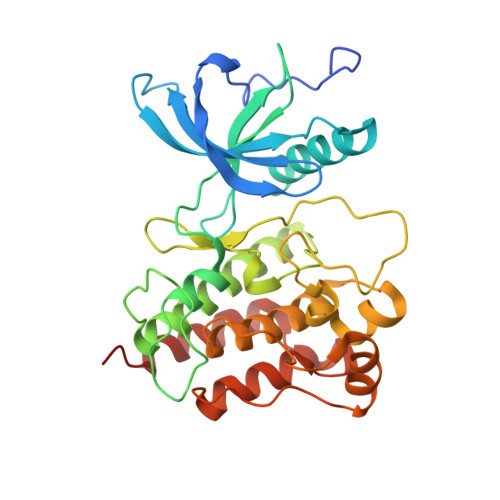Illuminating the Molecular Mechanisms of Tyrosine Kinase Inhibitor Resistance for the FGFR1 Gatekeeper Mutation: The Achilles' Heel of Targeted Therapy.
Sohl, C.D., Ryan, M.R., Luo, B., Frey, K.M., Anderson, K.S.(2015) ACS Chem Biol 10: 1319-1329
- PubMed: 25686244
- DOI: https://doi.org/10.1021/acschembio.5b00014
- Primary Citation of Related Structures:
4RWI, 4RWJ, 4RWK, 4RWL - PubMed Abstract:
Human fibroblast growth factor receptors (FGFRs) 1-4 are a family of receptor tyrosine kinases that can serve as drivers of tumorigenesis. In particular, FGFR1 gene amplification has been implicated in squamous cell lung and breast cancers. Tyrosine kinase inhibitors (TKIs) targeting FGFR1, including AZD4547 and E3810 (Lucitanib), are currently in early phase clinical trials. Unfortunately, drug resistance limits the long-term success of TKIs, with mutations at the "gatekeeper" residue leading to tumor progression. Here we show the first structural and kinetic characterization of the FGFR1 gatekeeper mutation, V561M FGFR1. The V561M mutation confers a 38-fold increase in autophosphorylation achieved at least in part by a network of interacting residues forming a hydrophobic spine to stabilize the active conformation. Moreover, kinetic assays established that the V561M mutation confers significant resistance to E3810, while retaining affinity for AZD4547. Structural analyses of these TKIs with wild type (WT) and gatekeeper mutant forms of FGFR1 offer clues to developing inhibitors that maintain potency against gatekeeper mutations. We show that AZD4547 affinity is preserved by V561M FGFR1 due to a flexible linker that allows multiple inhibitor binding modes. This is the first example of a TKI binding in distinct conformations to WT and gatekeeper mutant forms of FGFR, highlighting adaptable regions in both the inhibitor and binding pocket crucial for drug design. Exploiting inhibitor flexibility to overcome drug resistance has been a successful strategy for combatting diseases such as AIDS and may be an important approach for designing inhibitors effective against kinase gatekeeper mutations.
Organizational Affiliation:
Department of Pharmacology, Yale University School of Medicine, New Haven, Connecticut 06520, United States.














